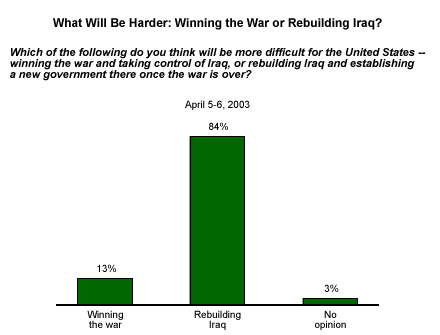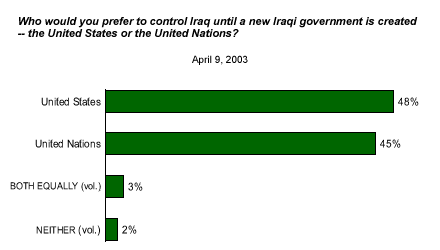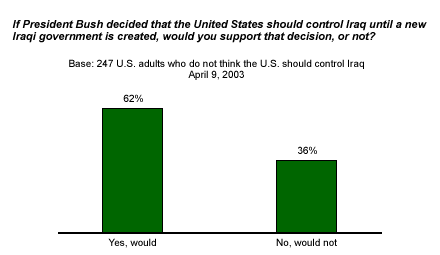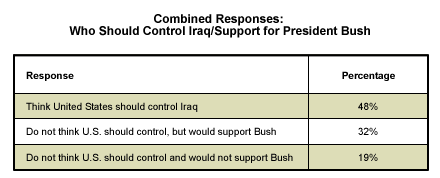Coalition forces have taken Baghdad. The statues of Saddam Hussein have fallen. While significant fighting and peacekeeping efforts abound throughout Iraq, the toppling of the Iraqi government in Baghdad on April 9 has left many wondering what will happen next. Most Americans believe that the process of rebuilding Iraq, both physically and governmentally, will be difficult. Americans are divided in their preferences as to whether the United States or the United Nations should control Iraq's transition, although most will be willing to support the president if he decides that he wants the United States to lead this effort. And most Americans believe the United States should have a great deal of responsibility in overseeing the government transition in Iraq.
What's Tougher, War or Its Aftermath?
While the invasion of Iraq met with stiffer Iraqi resistance than some people expected, the recent looting and unrest in Baghdad and other parts of Iraq suggest that the power vacuum left by Saddam's regime may cause even more difficulty. The American public is certainly anticipating this.
In polling conducted during the week prior to the fall of Baghdad*, a majority of Americans (84%) said that the process of rebuilding Iraq and establishing a new government will be harder than actually winning the war. Just 13% believed winning the war will be harder.

Polling conducted last week after the fall of Baghdad** shows that 82% of the public thinks creating a stable democratic government in Iraq will be "very" or "somewhat" difficult, and only 16% think it will be "very" or "somewhat" easy.
In Control?
Both President Bush and British Prime Minister Tony Blair have stated that the ultimate goal in this situation is for the Iraqi people to govern Iraq. But who will control Iraq until the Iraqis themselves are ready to take over? Last Thursday, U.S. Deputy Defense Secretary Paul Wolfowitz said that a U.S.-led coalition would lead Iraq's transition, with the United Nations as a major partner. This proposal will likely appease an American public that is divided about who should control Iraq. Forty-eight percent of Americans say the United States should control Iraq until a new Iraqi government is created, while 45% believe the United Nations should. Another 3% volunteer that it should be both equally, and 2% say that neither should. Certainly, the results on this question vary according to the respondent's political affiliation. Republicans are twice as likely as Democrats to say that the United States should control Iraq rather than the United Nations (66% to 33%).

But regardless of their preferences, most Americans believe the United States should be largely responsible for overseeing the transition to a new government. When asked how much responsibility the United States should have for establishing a stable democratic government in Iraq, 11% say the United States should be completely responsible, and 47% say the United States should be most responsible. Just 11% say the United States bears no responsibility whatsoever ***.
The Leadership Factor
Even though a substantial number of Americans would prefer that the United Nations -- not the United States -- control Iraq after the war, most of those Americans seem willing to support whatever decision Bush makes. Gallup asked the respondents who said they believe the United States should not be in charge after the war: "If President Bush decided that the United States should control Iraq until a new Iraqi government is created, would you support that decision, or not?" Nearly two-thirds of those who originally said that they preferred that the United States not control Iraq said that they would support Bush if he decides to take that approach. About a third of this group (36%) said they would not support such a decision by Bush.

Combining the results from these two questions allows for an even clearer read on the public's belief of who should control Iraq. As illustrated earlier, about half of the public (48%) prefers the United States should control Iraq's transition. Another third of the population (32%) does not prefer that the United States should be in control, but would be willing to support Bush if he decided to take that course of action. All told, 8 in 10 Americans would support U.S. control of Iraq until a new government is established there, while 19% would not.

Bottom Line
Americans recognize the fact that rebuilding Iraq will be a difficult task. On the question of who should shepherd that transition, Americans are clearly divided. But a vast majority of the public is ready to support a decision by Bush for the United States to take control, regardless of their own opinions about whether this is the best solution. It seems that Bush's current high approval rating may be helping him -- many Americans personally disagree with Bush's strategy in Iraq, but seem willing to stand behind him anyway.
*Results are based on telephone interviews with 1,009 national adults, aged 18 and older, conducted April 5-6, 2003. For results based on the total sample of national adults, one can say with 95% confidence that the maximum margin of sampling error is ±3%.
**Results are based on telephone interviews with 495 national adults, aged 18 and older, conducted April 9, 2003. For results based on the total sample of national adults, one can say with 95% confidence that the maximum margin of sampling error is ±5%.
***Results are based on telephone interviews with 522 national adults, aged 18 and older, conducted April 10, 2003. For results based on the total sample of national adults, one can say with 95% confidence that the maximum margin of sampling error is ±5%.
